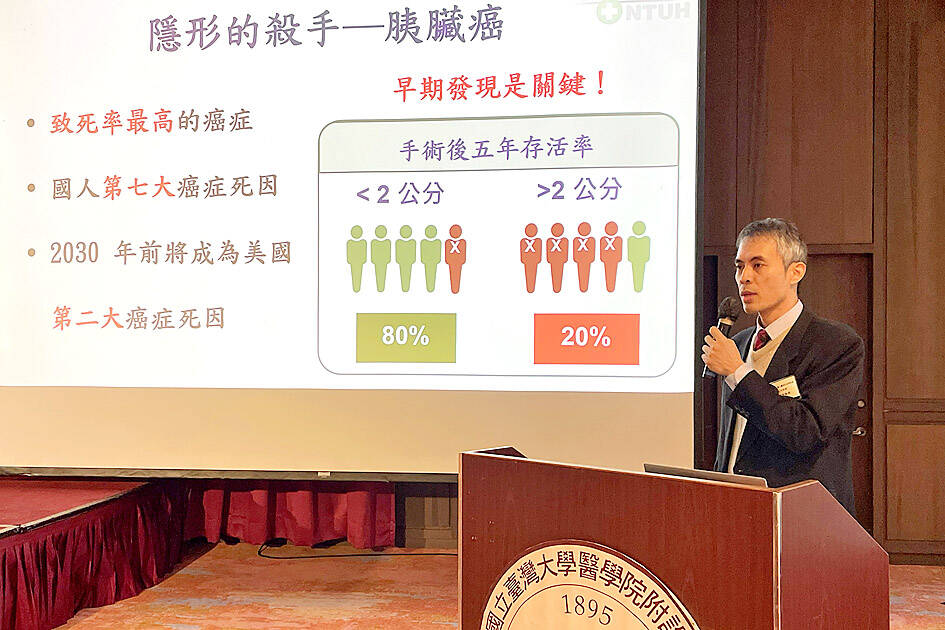National Taiwan University Hospital (NTUH) yesterday said its pancreatic cancer team has developed an artificial intelligence (AI)-assisted model for interpreting computed tomography (CT) scans, which can detect pancreatic cancer more accurately and at earlier stages.
Department of Internal Medicine professor Liao Wei-chih (廖偉智) said pancreatic cancer was the seventh-leading cause of cancer-related death in Taiwan in 2022, and it has been estimated that it could become the second-leading cause of cancer-related deaths in the US before 2030.
“Pancreatic cancer can progress rapidly, so early detection is the key to ensure a better prognosis,” he said.

Photo: Chiu Chih-jou, Taipei Times
The five-year survival rate after surgical resection is about 80 percent if the tumor detected is 2cm or smaller, but the survival rate drops to less than 20 percent if it is detected when the tumor grows bigger than 2cm, he said.
Liao said that people with early-stage pancreatic cancer usually have no symptoms, and about 40 percent of the 2cm or smaller tumors in the pancreas cannot be detected by a CT scan, so the disease is often detected at a late stage.
The medical team introduced an AI deep-learning algorithm jointly developed with National Taiwan University to help detect smaller pancreatic tumors and it can also accurately distinguish pancreatic cancer tissue from non-cancerous tissue, aiding radiologists and clinicians in recognizing suspicious lesions on CT scans, he said.
The AI algorithm was trained by using images from more than 3,000 cases at the hospital and tested with nationwide clinical data. The sensitivity rate for detecting pancreatic tumors 2cm or smaller was about 80 percent and image interpretation can be done in 1 minute, Liao said.
The team’s studies were published in Lancet Digital Health in 2020 and in Radiology last year, the hospital said, adding that the study on the AI-based method to provide early detection of pancreatic cancer also earned the Alexander R. Margulis Award last year for the best original scientific article published in Radiology.
The AI-assisted diagnosis system has obtained a Food and Drug Administration (FDA) medical device license, a “breakthrough device” designation by the US FDA, as well as several patents in Taiwan and the US, Liao said.
Meanwhile, Liao said endoscopic ultrasound is also an important tool that the hospital’s pancreatic cancer team use for clarifying whether there is actually a pancreatic tumor, its precise location and size, as it offers the highest resolution of the pancreas.
Endoscopic ultrasound-guided biopsies can assist in the diagnostic evaluation of benign or malignant tumors, he said.
Citing the case of a pancreatic cancer patient who suffered jaundice and biliary obstruction, he said a stent can be inserted into the bile duct through endoscopy surgery to relieve the symptoms, while a stent to keep the duodenum open could let the patient feel like eating again, and that the procedure is minimally invasive and the patient recovers quickly after the surgery.
NTUH said the treatment of pancreatic cancer is more complicated than other cancers, so the hospital’s pancreatic cancer team consists of healthcare professionals from more than eight departments to provide early detection and personalized precision medicine to help patients effectively fight the disease.

A relatively large earthquake may strike within the next two weeks, following a magnitude 5.2 temblor that shook Taitung County this morning, the Central Weather Administration (CWA) said. An earthquake struck at 8:18am today 10.2km west of Taitung County Hall in Taitung City at a relatively shallow depth of 6.5km, CWA data showed. The largest intensity of 4 was felt in Taitung and Pingtung counties, which received an alert notice, while areas north of Taichung did not feel any shaking, the CWA said. The earthquake was the result of the collision between the Philippine Plate and the Eurasian Plate, the agency said, adding

Snow fell in the mountainous areas of northern, central and eastern Taiwan in the early hours of yesterday, as cold air currents moved south. In the northern municipality of Taoyuan, snow started falling at about 6am in Fusing District (復興), district head Su Tso-hsi (蘇佐璽) said. By 10am, Lalashan National Forest Recreation Area, as well as Hualing (華陵), Sanguang (三光) and Gaoyi (高義) boroughs had seen snowfall, Su said. In central Taiwan, Shei-Pa National Park in Miaoli County and Hehuanshan National Forest Recreation Area in Nantou County saw snowfall of 5cm and 6cm respectively, by 10am, staff at the parks said. It began snowing

Global bodies should stop excluding Taiwan for political reasons, President William Lai (賴清德) told Pope Francis in a letter, adding that he agrees war has no winners. The Vatican is one of only 12 countries to retain formal diplomatic ties with Taiwan, and Taipei has watched with concern efforts by Beijing and the Holy See to improve ties. In October, the Vatican and China extended an accord on the appointment of Catholic bishops in China for four years, pointing to a new level of trust between the two parties. Lai, writing to the pope in response to the pontiff’s message on Jan. 1’s

HOLIDAY EXERCISE: National forest recreation areas from north to south offer travelers a wide choice of sights to connect with nature and enjoy its benefits Hiking is a good way to improve one’s health, the Forestry and Nature Conservation Agency said, as it released a list of national forest recreation areas that travelers can visit during the Lunar New Year holiday. Taking a green shower of phytoncides in the woods could boost one’s immunity system and metabolism, agency Director-General Lin Hwa-ching (林華慶) cited a Japanese study as saying. For people visiting northern Taiwan, Lin recommended the Dongyanshan National Forest Recreation Area in Taoyuan’s Fusing District (復興). Once an important plantation in the north, Dongyanshan (東眼山) has a number of historic monuments, he said. The area is broadly covered by